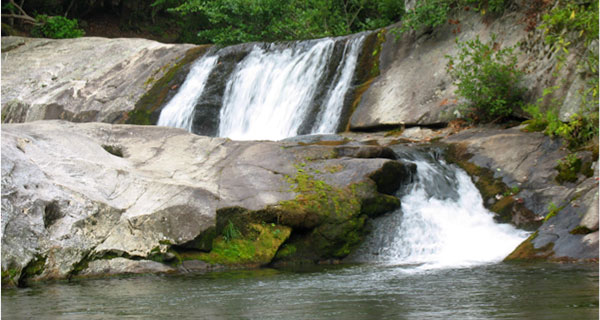Lost Cove Creek is one of the most beautiful streams in North Carolina. It’s a tributary to Wilson Creek. The stream is “catch and release – fly fishing” only. It flows through the Lost Cove Wilderness Study Area in the Pisgah National Forest. It seems that most of the trout are wild rainbows, from our own experience, but it’s known for its brown trout. It has a reputation for having some very large brown trout. We have been told that it has brook trout in its headwaters, but we have not verified that. Each time we have asked anyone about this, we have received conflicting answers. We’re not certain if studies have been done in this regard either. We caught a few rainbow trout the one and only time we have fished the stream, but no brown trout. Much of that was dry, fly fishing, which probably affect our results, species wise, but we didn’t catch a brown on a nymph and we did fish one for about two hours and still only caught rainbows.
Unlike most headwater streams in Western North Carolina, this stream’s decline is moderate in the high elevations. Its steep declines come below its uppermost headwaters. Also, I don’t think I’ve ever seen a freestone mountain stream any clearer than this one. That’s also a big factor in catching the browns. We have not fished early, or very late, and that’s almost a requirement on bright, blue-bird days, for catching brown trout from this type of water. The creek has a lot of short plunges between pools and a few runs and short sections of riffles, but much of its water consists of rather large pools for its small size.
Most anglers fish this stream from the “Hunt/Fish Falls Trail” or Forest Service Trail #263. It’s really the only trail you can use to fish the stream during a day trip. You would think that probably means the same water gets fished over and over but I don’t think that should really be much of a concern. I’ll explain why shortly. I’m also confident that most anglers, fish the “Delayed Harvest” section of Wilson Creek, which begins at the mouth of Lost Cove Creek and goes downstream. My guess is that only the avid fly anglers choose to fish this stream’s remote sections. That’s a good thing as far as I’m concerned, and I don’t mean that selfishly. I will probably never be able to fish most of its waters. Fly fishing Lost Cove Creek can be tough.
The Hunt/Fish Falls Trail can be accessed from Forest Service Road #464. It’s only a three/quarter mile trail to the stream – that seems more like a mile almost straight up if you’re headed back to your vehicle. I’m very positive this is another big reason it isn’t ever crowded with anglers, even in its most accessible location. Most of the people that use this trail use it to see the waterfalls which start at the foot of the trail. It isn’t your normal waterfall. It’s a series of several short cascades with pools between them, which are also good spots to place a fly. Boulder Creek may have been a better name for it but, on second thought, I guess Lost Cove Creek is also a good name. It’s really a beautiful place.
There are several other trails that lead into, and through, the Lost Cove Valley, but all of them would require an overnight trip and preferably more than two days to reach much of the creek’s waters. Sorry, but we discovered this a little too late in my life to tell you much more about it. The trip down into the Hunt/Fish Falls area is well worth the effort. You can fish as long, and as far, as you desire. It’s just that your always thinking about climbing back out and, with a heavy commercial camera, that isn’t all that easy.
Gragg Prong is a small tributary of Lost Cove Creek that’s also a wild trout stream. It is very small with about a mile of water that isn’t on private property. Forest Service Road crosses this stream where it can be accessed.
Rockhouse Creek is a tributary of Lost Cove Creek that enters near Edgemont. This is a wild trout stream, not to be confused with another Rockhouse Creek in a different county. Forest Service road #981 flows along the small stream. The road crosses the creek in its headwater and you have to hike upstream within the streambed to go upstream from that point. Also, be aware that there is private property along this stream that should be avoided. Both Rockhouse Creek and Gragg Prong have mostly small rainbows.
Season: The season runs year-round
Winter: Trout can be caught on most warm winter days.
Spring: Fly fishing Lost Cove Creek during the Springtime is the best time.
Summer: Summertime may get a little slow due to warm water temperatures.
Fall: Fall is certainly the most beautiful time to fish Lost Cove Creek.
James Marsh is the Owner of The Perfect Fly online and catalog mail-order store. www.perfectflystore.com.
